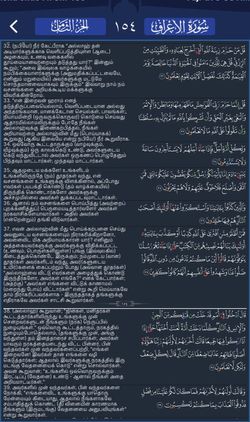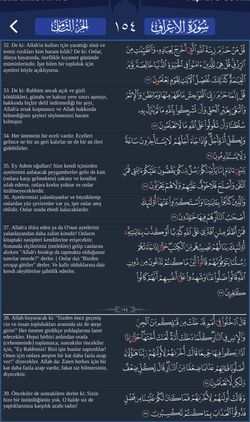Nov 21, 2024
Surah Al A'araf (Verses 32-39)
بِسْمِ ٱللَّٰهِ ٱلرَّحْمَٰنِ ٱلرَّحِيمِ,
(bi-smi llāhi r-raḥmāni r-raḥīm)
"In the name of Allah, the Most Gracious, the Most Merciful"
"Assalamualaikum/Hello and welcome! It's a pleasure to have you join us on this platform. Feel free to explore and engage with our community."
Feel free to join the cafe and our Instagram page for notifications and updates;
Hilokal;
https://hilokal.page.link/eUxfM
Instagram;
https://instagram.com/ideologyovlife?igshid=NjIwNzIyMDk2Mg==
Chapter 7, Verses 32-39
Surah Al-A'araf, Verses 32-39
Recitation.
Translation.
Tafseer.
LESSON # 4 Chapter # 7 (Surah Al A'araf)
For English Reference;
https://www.islamicstudies.info/tafheem.php?sura=7&verse=32&to=39
For Urdu Reference;
https://tafheem.net/islamikitabein/urduref.php?sura=7&verse=32-39
Translations;
Please follow the sequence to find your language;
English
Urdu
Hindi
Tamil
Bangali
Korean
Kurdish
Turkish
Portuguese
Spanish
LESSON # 4 of Chapter # 7.
Difficult Vocabularies from LESSON # 4 (Chapter # 7 Verses 32-39)
Verse # 32.
1- Insurmountable. (Adjective)
((Especially of a problem or a difficulty) so great that it cannot be dealt with successfully.)
2- Fidelity. (Noun)
(Honest or lasting support, or loyalty, especially to a sexual partner.)
3- Abundantly. (Adverb)
(In large quantities or amounts.)
Verse # 33.
4- Overt. (Adjective)
(Done or shown publicly or in an obvious way and not secret.)
5- Infallible. (Adjective)
(Never wrong, failing, or making a mistake.)
6- Reverence. (Verb)
(To very much respect and admire someone or something.)
7- Dereliction. (Noun)
((Especially of a building) a state of not being cared for.)
8- Whim. (Noun)
(A sudden wish or idea, especially one that cannot be reasonably explained.)
9- Prerogative. (Noun)
(Something that certain people are able or allowed to do or have, but is not possible or allowed for everyone.)
10- Usurp. (Verb)
(To take control of a position of power, especially without having the right to.)
Verse # 34.
11- Tarry. (Verb)
(To stay somewhere for longer than expected and delay leaving.)
Verse # 35.
12- Shun. (Verb)
(To avoid something.)
Verse # 36.
13- Unremitting. (Adjective)
(Never stopping, becoming weaker, or failing.)
Verse # 38.
14- Inducements. (Noun)
(An act or thing that is intended to persuade someone or something.)
15- Succumbed . (Verb)
(To lose the determination to oppose something; to accept defeat.)
16- Perpetrated. (Verb)
(To commit a crime or a violent or harmful act.)
17- Propensity. (Noun)
(The fact that someone is likely to behave in a particular way, especially a bad way.)
18- Posterity. (Noun)
(The people who will exist in the future.)
19- Hideous. (Adjective)
(Extremely ugly or bad.)
20- Catastrophic. (Noun)
(A sudden event that causes very great trouble or destruction.)
21- Arrears (Noun)
(Money that is owed and should already have been paid.)











LESSON # 4 of Chapter # 7.
References from LESSON # 4 (Chapter # 7 Verses 32-39)
Verse # 33.
1- Qur'aan (6:151 nn 128).
https://islamicstudies.info/reference.php?sura=6&verse=151¬e=128
2- Qur'aan (6:151 nn 131)
https://islamicstudies.info/reference.php?sura=6&verse=151¬e=131
Verse # 34
3- Qur'aan (71:4-10)
https://islamicstudies.info/reference.php?sura=71&verse=4&to=10
4- Qur'aan (71:12)
https://islamicstudies.info/reference.php?sura=71&verse=12
Verse # 36
5- Qur'aan (2:38-39)
https://islamicstudies.info/reference.php?sura=2&verse=38&to=39
6- Qur'aan (20:123-124)
https://islamicstudies.info/reference.php?sura=20&verse=123&to=124
7- Qur'aan (3:81 nn 69)
https://islamicstudies.info/reference.php?sura=3&verse=81¬e=69
Verse # 38.
8- (Cf. Ibn Majah, Muqaddimat Bab Man Ahya Sunnah qad umitat, where the words are slightly different - Ed.)
9- (See Bukhari, Kitab al-Jana'iz, Bab Qawlih 'alay al-Salam Yu'addhab al-Mayyit bi Ba'd Buka'i ahlih 'alayh - Ed.)
Verse # 39.
10- Qur'aan (34:31-32)
https://islamicstudies.info/reference.php?sura=34&verse=31&to=32
LESSON # 4 of Chapter # 7.
Summary of Verses (32-39) of Chapter # 7 Surah Al A'araf:
Here’s a short summary of the verses from Surah Al-A'raf:
1- Adornments and Good Things:
Allah allows all good things for mankind, intended for believers in this world, and exclusively for them in the Hereafter.
2- False Creeds and Social Systems:
Any system that forbids what Allah has made lawful is not from God and cannot be the true path to spiritual growth.
3- Test of Life:
Even disbelievers are given worldly bounties as a test, but in the Afterlife, only the faithful will enjoy Allah’s rewards.
4- Forbidden Acts:
Allah forbids indecency (both public and hidden), sin, transgression, associating others with Him, and false attributions about Him.
5- Transgression:
Exceeding the limits set by Allah is rebellion, and those who act based on personal whims rather than divine guidance are in transgression.
6- Term of Nations:
Every nation has a set term. Once a nation’s evil exceeds its limits, it is denied further respite.
7- Guidance and Consequences:
Those who accept the guidance of Allah’s messengers will have no fear or grief. Rejecting Allah’s signs leads to eternal punishment in Hell.
8- Invention of Falsehoods:
Those who fabricate lies about Allah or reject His revelations will face their punishment, and their false gods will abandon them.
9- Punishment of Hell:
The condemned will join earlier nations in Hell, where they will curse their predecessors for leading them astray. Each group shares in the punishment for their misdeeds and the evil they passed down.
10- Shared Responsibility for Misdeeds:
Those who introduce wrongful practices are responsible not only for their actions but for the consequences on future generations.
11- Good Deeds and Influence:
Those who lead by good example and righteous deeds will have their reward, as will those who benefit from their positive influence.
12- Retribution in the Hereafter:
Full justice can only be achieved in the Hereafter, as worldly life cannot fully account for the impact of actions that affect multiple generations.
13- Mutual Blame in Hell:
In Hell, the condemned will blame each other, recognizing that both their leaders and themselves are equally responsible for their fate.
Thank you everyone for joining.
May Allah rewards all of you for your precious time spent here & may Allah keeps pouring his blessings upon you and your loved ones.
Stay safe & and blessed.
Aslamualaikum to all of you.
J A Z A K A L L A H U K H A I R E V E R Y O N E .
By undefined
18 notes ・ 1 views
English
Proficient